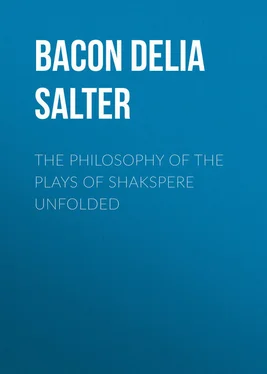Delia Bacon - The Philosophy of the Plays of Shakspere Unfolded
Здесь есть возможность читать онлайн «Delia Bacon - The Philosophy of the Plays of Shakspere Unfolded» — ознакомительный отрывок электронной книги совершенно бесплатно, а после прочтения отрывка купить полную версию. В некоторых случаях можно слушать аудио, скачать через торрент в формате fb2 и присутствует краткое содержание. Жанр: literature_19, foreign_antique, foreign_prose, на английском языке. Описание произведения, (предисловие) а так же отзывы посетителей доступны на портале библиотеки ЛибКат.
- Название:The Philosophy of the Plays of Shakspere Unfolded
- Автор:
- Жанр:
- Год:неизвестен
- ISBN:нет данных
- Рейтинг книги:3 / 5. Голосов: 1
-
Избранное:Добавить в избранное
- Отзывы:
-
Ваша оценка:
- 60
- 1
- 2
- 3
- 4
- 5
The Philosophy of the Plays of Shakspere Unfolded: краткое содержание, описание и аннотация
Предлагаем к чтению аннотацию, описание, краткое содержание или предисловие (зависит от того, что написал сам автор книги «The Philosophy of the Plays of Shakspere Unfolded»). Если вы не нашли необходимую информацию о книге — напишите в комментариях, мы постараемся отыскать её.
The Philosophy of the Plays of Shakspere Unfolded — читать онлайн ознакомительный отрывок
Ниже представлен текст книги, разбитый по страницам. Система сохранения места последней прочитанной страницы, позволяет с удобством читать онлайн бесплатно книгу «The Philosophy of the Plays of Shakspere Unfolded», без необходимости каждый раз заново искать на чём Вы остановились. Поставьте закладку, и сможете в любой момент перейти на страницу, на которой закончили чтение.
Интервал:
Закладка:
It is only necessary to premise, that this work is one of the many works of this school, in which a grave, profoundly scientific design is concealed under the disguise of a gay, popular, attractive form of writing, though in this case the audience is from the first to a certain extent select. It has no platform that takes in – as the plays do, with their more glaring attractions and their lower and broader range of inculcation, – the populace. There is no pit in this theatre. It is throughout a book for men of liberal culture; but it is a book for the world, and for men of the world, and not for the cloister merely, and the scholar. But this, too, has its differing grades of readers, from its outer court of lively pastime and brilliant aimless chat to that esoteric chamber, where the abstrusest parts of sciences are waiting for those who will accept the clues, and patiently ascend to them.
The work is popular in its form, but it is inwoven throughout with a thread of lurking meanings so near the surface, and at times so boldly obtruded, that it is difficult to understand how it could ever have been read at all without occasioning the inquiry which it was intended to occasion under certain conditions, but which it was necessary for this society to ward off from their works, except under these limitations, at the time when they were issued. For these inner meanings are everywhere pointed and emphasized with the most bold and vivid illustration, which lies on the surface of the work, in the form of stories, often without any apparent relevance in that exterior connection – brought in, as it would seem, in mere caprice or by the loosest threads of association. They lie, with the 'allegations' which accompany them, strewn all over the surface of the work, like 'trap' on 'sand-stone,' telling their story to the scientific eye, and beckoning the philosophic explorer to that primeval granite of sciences that their vein will surely lead to. But the careless observer, bent on recreation, observes only a pleasing feature in the landscape, one that breaks happily its threatened dulness; the reader, reading this book as books are wont to be read, finds nothing in this phenomenon to excite his curiosity. And the author knows him and his ways so well, that he is able to foresee that result, and is not afraid to trust to it in the case of those whose scrutiny he is careful to avoid. For he is one who counts largely on the carelessness, or the indifference, or the stupidity of those whom he addresses. There is no end to his confidence in that. He is perpetually staking his life on it. Neither is he willing to trust to the clues which these unexplained stories might seem of themselves to offer to the studious eye, to engage the attention of the reader – the reader whose attention he is bent on securing. Availing himself of one of those nooks of discourse, which he is at no loss for the means of creating when the purpose of his essaie requires it, he beckons the confidential reader aside, and thus explains his method to him, outright, in terms which admit of but one construction. 'Neither these stories,' he says, 'nor my allegations do always serve simply for example, authority, or ornament; I do not only regard them for the use I make of them; they carry sometimes, besides what I apply them to , the seeds of a richer and bolder matter, and sometimes, collaterally, a more delicate sound , both to me myself, – who will say no more about it in this place ' [we shall hear more of it in another place, however, and where the delicate collateral sounds will not be wanting] – 'both to me myself, and to others who happen to be of my ear .'
To the reader, who does indeed happen to be of his ear, to one who has read the 'allegations' and stories that he speaks of, and the whole work, and the works connected with it, by means of that knowledge of the inner intention, and of the method to which he alludes, this passage would of course convey no new intelligence. But will the reader, to whom the views here presented are yet too new to seem credible, endeavour to imagine or invent for himself any form of words, in which the claim already made in regard to the style in which the great original writers of this age and the founders of the new science of the human life were compelled to infold their doctrine, could have been, in the case of this one at least, more distinctly asserted. Here is proof that one of them, one who counted on an audience too, did find himself compelled to infold his richer and bolder meanings in the manner described. All that need be claimed at present in regard to the authorship of this sentence is, that it is written by one whose writings, in their higher intention, have ceased to be understood, for lack of the ' ear ' to which his bolder and richer meanings are addressed, for lack of the ear , to which the collateral and more delicate sounds which his words sometimes carry with them are perceptible; and that it is written by a philosopher whose learning and aims and opinions, down to the slightest points of detail, are absolutely identical with those of the principal writers of this school.
But let us look at a few of the stories which he ventures to introduce so emphatically, selecting only such as can be told in a sentence or two. Let us take the next one that follows this explanation – the story in the very next paragraph to it. The question is apparently of Cicero, of his style, of his vanity, of his supposed care for his fame in future ages, of his real disposition and objects .
'Away with that eloquence that so enchants us with its harmony , that we should more study it than things ' [what new soul of philosophy is this, then, already?] – 'unless you will affirm that of Cicero to be of so supreme perfection as to form a body of itself. And of him, I shall further add one story we read of to this purpose, wherein his nature will much more manifestly be laid open to us ' [than in that seeming care for his fame in future ages, or in that lower object of style, just dismissed so scornfully].
'He was to make an oration in public, and found himself a little straitened in time , to fit his words to his mouth as he had a mind to do , when Eros , one of his slaves, brought him word that the audience was deferred till the next day, at which he was so ravished with joy that he enfranchised him .'
The word 'time' – here admits of a double rendering whereby the author's aims are more manifestly laid open; and there is also another word in this sentence which carries a 'delicate sound' with it, to those who have met this author in other fields, and who happen to be of his counsel. But lest the stories of themselves should still seem flat and pointless, or trivial and insignificant to the uninstructed ear, it may be necessary to interweave them with some further 'allegations on this subject,' which the author assumes, or appears to assume, in his own person.
'I write my book for few men , and for few years . Had it been matter of duration , I should have put it into a better language . According to the continual variation that ours has been subject to hitherto [and we know who had a similar view on this point], who can expect that the present form of language should be in use fifty years hence. It slips every day through our fingers; and since I was born, is altered above one half. We say that it is now perfect: every age says the same of the language it speaks . I shall hardly trust to that so long as it runs away and changes as it does.
''Tis for good and useful writings to nail and rivet it to them, and its reputation will go according to the fortune of our state. For which reason, I am not afraid to insert herein several private articles, which will spend their use amongst the men now living , AND THAT CONCERN THE PARTICULAR KNOWLEDGE OF SOME WHO WILL SEE FURTHER INTO THEM THAN THE COMMON READER.' But that the inner reading of these private articles – that reading which lay farther in – to which he invites the attention of those whom it concerns – was not expected to spend its use among the men then living, that which follows might seem to imply. It was that wrapping of them, it was that gross superscription which 'the fortune of our state was likely to make obsolete ere long,' this author thought, as we shall see if we look into his prophecies a little. 'I will not, after all, as I often hear dead men spoken of, that men should say of me : "He judged , and LIVED SO and SO. Could he have spoken when he was dying, he would have said so or so . I knew him better than any."
Читать дальшеИнтервал:
Закладка:
Похожие книги на «The Philosophy of the Plays of Shakspere Unfolded»
Представляем Вашему вниманию похожие книги на «The Philosophy of the Plays of Shakspere Unfolded» списком для выбора. Мы отобрали схожую по названию и смыслу литературу в надежде предоставить читателям больше вариантов отыскать новые, интересные, ещё непрочитанные произведения.
Обсуждение, отзывы о книге «The Philosophy of the Plays of Shakspere Unfolded» и просто собственные мнения читателей. Оставьте ваши комментарии, напишите, что Вы думаете о произведении, его смысле или главных героях. Укажите что конкретно понравилось, а что нет, и почему Вы так считаете.












